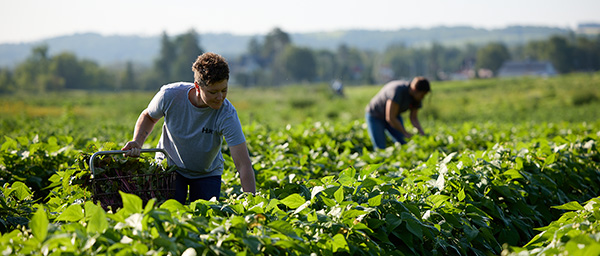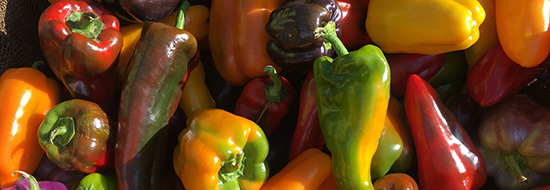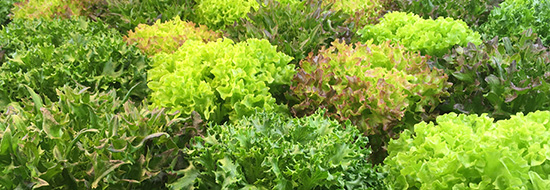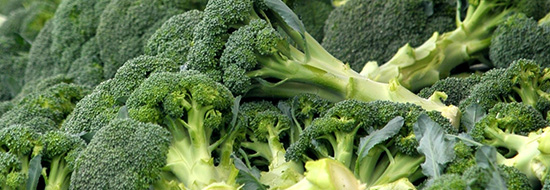DACF Home → Bureaus & Programs → Bureau of Agriculture → Agricultural Resource Development Division → Agricultural Business and Market Development Program →Local Foods Procurement Program
Farm to Institution
Farm to institution encourages institutions to serve more local food to improve public health and strengthen the local food economy. Approximately 25 percent of Maine people rely on state-funded institutions, including healthcare facilities, colleges, universities, schools, and correctional facilities for some, or all of their meals. Ensuring that institutions purchase Maine foods is important to ensuring that Maine people, regardless of their background or income level, are able to enjoy locally grown food.
Institutions can use their purchasing power to support the local community through purchasing local food as those dollars stay in the local economy and directly support food producers. Consumers and other businesses can look to institutions for inspiration on how to purchase and serve more local food throughout the year.
Selling to institutions can be a great market for local farms as many institutions consistently purchase large amounts of food year-round.

There are many examples within Maine’s food supply chain that demonstrate effective farm-to-institution systems. Farms are growing specific types and quantities of produce specifically to meet institutional needs, processors are lightly processing vegetables so they are easy for cafeterias to use year-round, distributors are ensuring that more local food are being delivered to colleges and universities, and institutions are preparing delicious meals with local produce, meat, eggs, dairy, flour, and other Maine grown and produced ingredients.
To learn more about Maine’s Local Foods Procurement Program, and how to achieve farm-to-institution goals, reach out to Brittany Peats, Maine DACF Institutional Market Development Coordinator at brittany.peats@maine.gov.
On this Page:
- Resources for Institutions
- Resources for Producers & Food Processors
- Resources for Schools
- Success Stories
Resources for Institutions

There are many resources for institutions that are interested in purchasing Maine food. Institutions can source more local food by working with a distributor that sells Maine food, buying directly from a local farmer, fisherman, or food producer, or growing produce in an on-site garden.
Connect with Local Food Producers +
- The Real Maine Wholesale database includes Maine farms and food producers that sell to wholesale markets, including institutions. It is possible to search by type of food and location.
- The Department of Education has a map of farms that have sold to K – 12 schools in the past.
- MOFGA’s database includes location and items.
Close -
Work with a Distributor to Purchase Local Food +
Farm to Institution New England has created this toolkit to assist institution working with distributors: A Toolkit For Institutional Purchasers: Sourcing Local Food From Distributors
These distributors buy from local producers and sell to institutions:
Close -
Connect with Other Institutions +
Several nonprofits support institutions that are interested in sourcing more local food by providing relevant research and resources and by organizing networks of people working on similar issues.
- Maine Farm to Institution is a network led by the Healthy Communities of the Capitol Area.
- Maine Harvest of the Month by the Department of Education, is designed for K – 12 schools but could be adapted by other institutions.
- Farm to Institution New England is a regional nonprofit with many toolkits, recorded webinars, and other research, as well as networks for various institutional sectors.
Close -
Resources for Producers & Food Processors
 Institutions can be a great market for producers and food processors and there is support and funding available to help them. Producers may need support analyzing their business plan, adding infrastructure to scale up, securing additional certification, learning to market their farm to new customers, and developing new relationships.
Institutions can be a great market for producers and food processors and there is support and funding available to help them. Producers may need support analyzing their business plan, adding infrastructure to scale up, securing additional certification, learning to market their farm to new customers, and developing new relationships.
Technical Assistance +
- The Department of Agriculture, Conservation and Forestry has many farmer resources, including business planning, loans and grants, farmland access, education. The Quality Assurance & Regulations Division can assist with certification questions.
- University of Maine Cooperative Extension provides technical assistance for beginning farmers.
- The Maine Organic Farmers and Gardeners Association (MOFGA) provides technical assistance for somewhat experienced farmers.
- Maine Farmland Trust provides technical assistance for experienced farmers.
- The Maine Farmer Resource Network provides additional resources.
- CEI provides financing and technical assistance to farms, food producers, fisheries, and aquaculture.
- Maine Center for Entrepreneurs advises food and beverage companies.
Close -
Funding Opportunities +
State
- The Maine Department of Agriculture, Conservation and Forestry has compiled a list of grant writers who may be available to consult with Maine farmers, producers, processors, and other agricultural entities to prepare applications for state, federal, and private grant and funding opportunities.
- Resilience Food System Infrastructure Grants – This new grant program will have two phases: infrastructure grants will open in the spring and equipment only grants will open in the fall.
- Agriculture Development Grants
- Specialty Crop Block Grant.
- FAME for business owners
- DACF Funding Opportunities - To learn more about DACF agricultural funding opportunities, sign up for notices.
Federal
- The Regional Food System Partnerships offers three types of projects, 24-month Planning and Design, 3-year Implementation and Expansion Projects, and Farm to Institution.
- Local Meat Capacity Grant supports independently owned meat and poultry processing businesses with funds to provide more and better processing options for local livestock producers by modernizing, increasing, diversifying and decentralizing meat and poultry processing capacity.
- The Local Agriculture Market Program supports the development of value-added agricultural products.
- The Local Food Promotion Program funds projects that develop, coordinate and expand local and regional food business enterprises that engage as intermediaries in indirect producer to consumer marketing to help increase access to and availability of locally and regionally produced agricultural products.
- Community Food Projects Competitive Grants Program is intended to bring together stakeholders from distinct parts of the food system and to foster understanding of national food security trends and how they might improve local food systems.
- Rural Energy for America Program Renewable Energy Systems & Energy Efficiency Improvement Guaranteed Loans & Grants provides guaranteed loan financing and grant funding for new energy efficient equipment and new system loans for agricultural production and processing.
- The Value-Added Producer Grant program funds economic planning activities or working capital activities related to the processing and/or marketing of locally produced agricultural food products.
- Meat and Poultry Processing Expansion Program provides grants to help eligible processors expand their processing capacity, which create new, better and more processing options for meat and poultry producers.
- Northeast USDA Regional Food Business Center sub-award funding applications will open in mid-2024 with awards for technical assistance providers and in early-2025 with business builders awards.
Private
- The Henry P. Kendall Foundation’s New England Food Vision Prize Program aims to increase the amount of local and regional food prepared and served on New England college and university campuses and within K-12 public school districts, helping to strengthen the region’s food system. The Prize program, offered annually, awards grants up to $200,000 to winning teams.
- Full Plates Full Potential is working with the USDA to offer The School Food System Innovation Grant. These grants will support innovative and collaborative pilot projects that reimagine what the local school food system could look like and have the potential to be sustained and/or scaled. Projects can be regional or statewide in scale and should address the unique barriers faced by schools when trying to increase their use of Maine-based items in school meal programs and expand their suppliers. Funding requests can range from $100,000 to $1,500,000 and are due May 1, 2024.
Close -
Resources for Schools
- The Department of Education manages the Farm and Sea to School program to encourage K – 12 schools to purchase more local food.
- The Maine Farm and Sea to School Network, led by the Healthy Community of the Capital Area, supports this work through collaboration and an institute.
- DACF houses Maine Agriculture in the Classroom which teaches students about the role of agriculture in the economy. It is funded by the Maine Agriculture specialty license plate, grants, and private sponsors and enables the organization to provide grants for school gardens and greenhouses, agricultural awareness, and agricultural leadership.
Success Stories
There are many examples within Maine’s food supply chain that demonstrate effective farm-to-institution systems. Farms are growing specific types and quantities of produce specifically to meet institutional needs, processors are lightly processing vegetables so they are easy for cafeterias to use year-round, distributors are ensuring that more local food are being delivered to colleges and universities, and institutions are preparing delicious meals with local produce, meat, eggs, dairy, flour, and other Maine grown and produced ingredients.
Learn more about local food procurement:
- Students Enjoy Local Yogurt from Milkhouse
- Maine’s Local Foods Procurement Program Works to Increase Farm-to-Institution Food Purchasing
- Farm to Institutions Spotlight: The Good Crust
- A Family Farm in Maine Reports on their Experience Selling to Institutions (Farm to Institution New England)
- Serving Time and Good Food at Mountain View Correctional Facility (MOFGA)
- Maine Farm and Sea to School Videos (Maine Department of Education)
- Sustainable Dogfish Gains in Popularity at Maine Universities (Farm to Institution New England)
- Video about Mountain View Correctional Facility (YouTube)